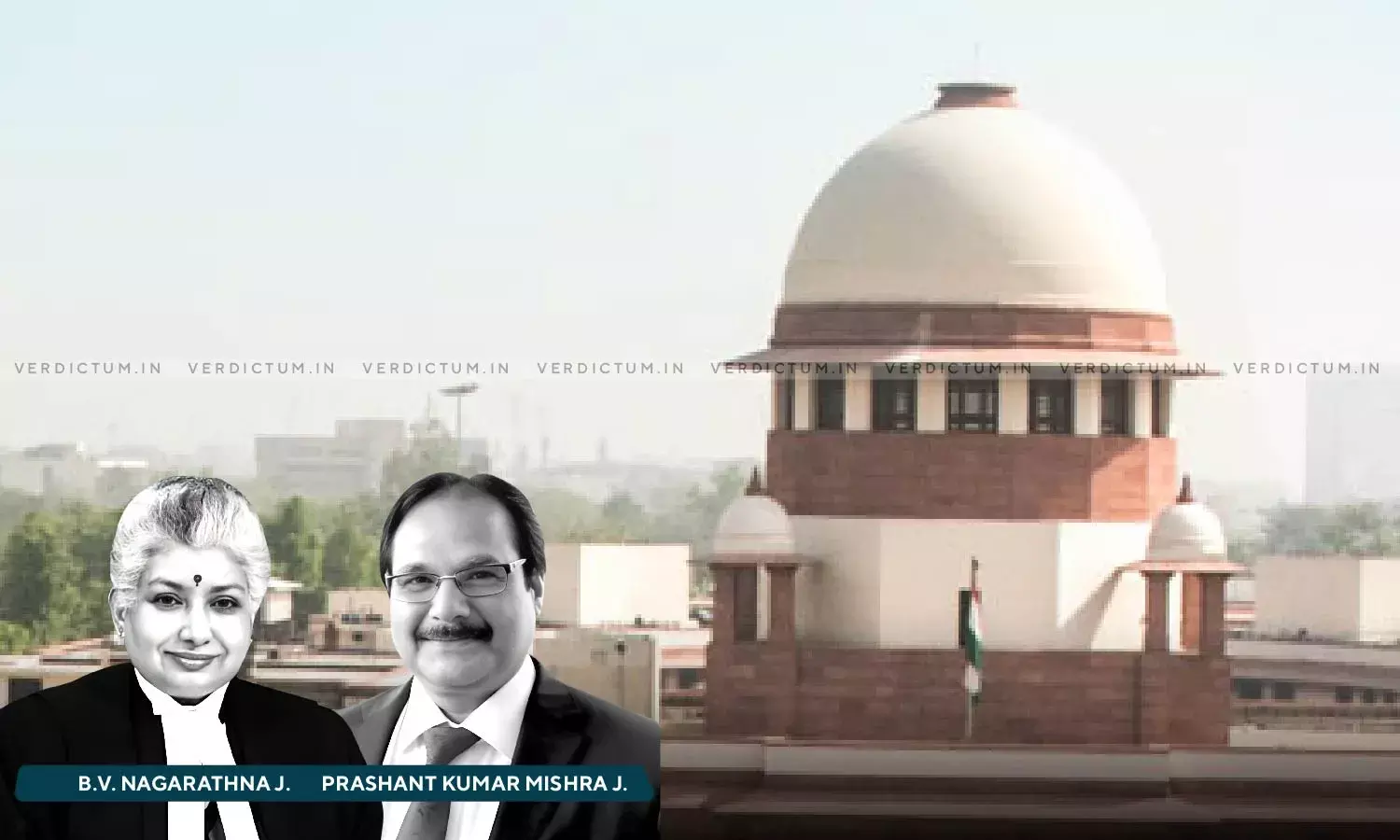Foreign Counterpart Of Indian Entity Treated As Permanent Establishment Since Incorporation: Apex Court Maintains Status Quo On Exemption Of Dividend Tax Earned By It

Finding that the Appellant/Revenue Department has failed to demonstrate why the provisions contained in Article 25 of DTAA and Article 8 (bis) of the Omani Tax Laws would not be applicable, the Supreme Court held that Article 8(bis) exempts dividend tax received by the assessee from its Permanent Establishment (PE) in Oman and by virtue of Article 25, the assessee is entitled to the same tax treatment in India as it received in Oman.
The Two Judge Bench of Justice B.V Nagarathna and Justice Prashant Kumar Mishra observed that “the assessee’s establishment in Oman has been treated as PE from the very inception up to the year 2011. There is no reason as to why all of a sudden, the assessee’s establishment in Oman would not be treated as PE when for about 10 years it was so treated, and tax exemption was granted basing upon the provisions contained in Article 25 read with Article 8 (bis) of the Omani Tax Laws”.
Senior Advocate Arijit Prasad appeared for the Appellant/Revenue, whereas Senior Advocate Arvind P. Dattar appeared for the Respondent/Assessee.
The brief facts of the case were that assessee is a multi-State Co-operative Society registered in India, under the administrative control of the Department of Fertilizers, Ministry of Agriculture and Co-operation, Government of India. In the business of manufacturing fertilizers, it entered a joint venture with Oman Oil Company to form the Oman Fertilizer Company SAOC (OMIFCO), a registered company in Oman under the Omani laws. The assessee has 25% share in the JV. The JV manufactures fertilizers, which are purchased by the Central Government. The assessee has a branch office in Oman which is independently registered as company under the Omani laws having permanent establishment status in Oman in terms of Article 25 of the DTAA.
During assessment, the Assessing Officer (AO) allowed tax credit in respect of the dividend income received by the assessee from the JV. The dividend income was simultaneously brought to tax as per Indian tax laws. However, under the Omani tax laws, exemption was granted to the dividend income by virtue of the amendments made in the Omani tax laws w.e.f the year 2000. The AO allowed credit for the said tax, which would have been payable in Oman, but exemption was granted. Thereafter, the Principal Commissioner of Income Tax (PCIT) issued a show cause notice under Section 263 of the Income Tax Act on the ground that the reliance placed on Article 25(4) of DTAA was erroneous in this case and no tax credit was due to the assessee under Section 90 of the Act. After considering Assessee’s reply, the PCIT held that Article 25 of Omani tax laws is not applicable in the instant case because there is tax payable on dividend in Oman and, accordingly, no tax has been paid and that assessee is not covered under the exemption. This order of PCIT was quashed by the ITAT.
After considering the submission, the Bench observed that Article 25 (2) of the India Oman DTAA provides that where a resident of India derives income, which in accordance with this agreement, may be taxed in the Sultanate of Oman, India shall allow as a deduction from the tax on the income of that resident an amount equal to the income tax paid in the Sultanate of Oman, whether directly or by deduction.
The Bench that Article 25 (4) clarifies that the tax payable in a Contracting State mentioned in clause 2 and clause 3 of the said Article shall be deemed to include the tax which would have been payable but for the tax incentive granted under the laws of the Contracting State and which are designed to promote development.
Finding that the term ‘incentive’ is neither defined in the Omani Tax Laws nor in the Income Tax Act, the Bench referred to the clarification letter addressed by the Secretary General for Taxation, Sultanate of Oman, Ministry of Finance, Muscat to Oman Oil Company SAOC, wherein it was clarified that the dividend distributed by all companies, including the tax-exempt companies would be exempt from payment of income tax in the hands of the recipients.
“By extending the facility of exemption, the Government of Oman intend to achieve its object of promoting development within Oman by attracting investments. Since the assessee has invested in the project by setting up a permanent establishment in Oman, as the JV is registered as a separate company under the Omani laws, it is aiding to promote economic development within Oman and achieve the object of Article 8 (bis). The Omani Finance Ministry concluded by saying that tax would be payable on dividend income earned by the permanent establishments of the Indian Investors, as it would form part of their gross income under Article 8, if not for the tax exemption provided under Article 8(bis)”, added the Bench.
The Bench further observed from a plain reading of Article 8 and Article 8 (bis), that under Article 8, dividend is taxable, whereas, Article 8(bis) exempts dividend received by a company from its ownership of shares, portions, or shareholding in the share capital in any other company.
The Supreme Court therefore dismissed the appeal.
Cause Title: Pr. CIT v. Krishak Bharti Cooperative Ltd. [Neutral Citation: 2023: INSC: 834]
Click here to read/download the Judgment

